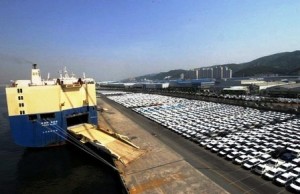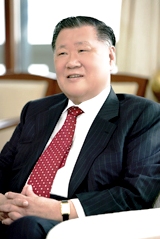The group representing virtually all of the automakers in Europe has come out against a proposed free trade agreement (FTA) with South Korea because it does not allow sufficient access by automakers to the restricted South Korean market. ACEA says the FTA “must improve.”
The export-driven South Korean car industry sends 73% of its production overseas. About 650,000 cars were exported to the EU markets in 2007, while just 31,000 were exported to South Korea from the EU according to European customs services.
“We support trade liberalization, but EU manufacturers must share equal benefits in fair trade agreements. It’s crucial that the forthcoming deal with South Korea is handled properly because it sets precedents for further arrangements with countries like Canada and India,” said Ivan Hodac, Secretary General ACEA.
Mong-Koo Chung, chairman of Hyundai Motor Company, says the goal this year “is increasing global sales and surprise the world once again in 2009.”
The European automobile industry operates vehicle assembly and engine production plants in 28 countries in Europe, with the number of plants adding up to 294. It is responsible for 6.7% of EU GDP with 2.3 million workers directly employed and another 9.8 million indirect jobs. ACEA members annually invest € 20 billion in R&D and vehicle taxes bring in € 378 billion a year
A similar FTA is on hold in the United States as the global Great Recession drags on.
Automobiles and related parts are the largest single component in trade between the European Union and South Korea. Forty percent of the EU trade deficit comes from disequilibrium in automotive trade.
European Union member states postponed a decision in July on the FTA after a many countries expressed clear concerns and several asked for further improvements, including changes in the wording. In addition, several EU Commissioners publicly expressed opposition.
It is expected that negotiations will continue over the coming months, but with massive unemployment in Europe and no end to the recession in sight, progress on the agreement will be difficult if not impossible.
Furthermore, European business federations have repeatedly called for a “balanced agreement,” which means both sides must benefit.
Several thorny issues remain unsolved. The groups claim that the proposed terms present an unfair competitive advantage to Korean industries and set a harmful precedent for existing and future FTAs between the EU and other major trading partners.
Perhaps most significant from a legal point of view is the charge that the terms undermine a long standing rule of EU trade policy by compromising on the so-called Duty Drawback clause and Rules of Origin threshold. Both are thought to be essential policy instruments to ensure a level playing field in international trade.
ACEA said the current proposals, furthermore, do not sufficiently improve access to the South Korean market, allowing South Korea to continue introducing its own unique requirements instead of applying international standards.
South Korea does not fully acknowledge international test cycles and standards, and applies its own unique rules. An approved and tested EU car cannot be sold in South Korea; costly modifications are required.
The current deal also of course affects EU industries far beyond the auto industry and is said to pose a severe risk to the manufacturing base of Europe.
|
Annual EU Trade Deficit With Korea |
|||
| 2004 | 2005 | 2006 | 2007 |
| €12.7 Billion | €14.2 Billion | €19.9 Billion | €14.8 Billion |
| Automotive is the largest single component in the EU/South Korea trade. Forty percent of the EU trade deficit comes from disequilibrium in automotive trade. | |||


